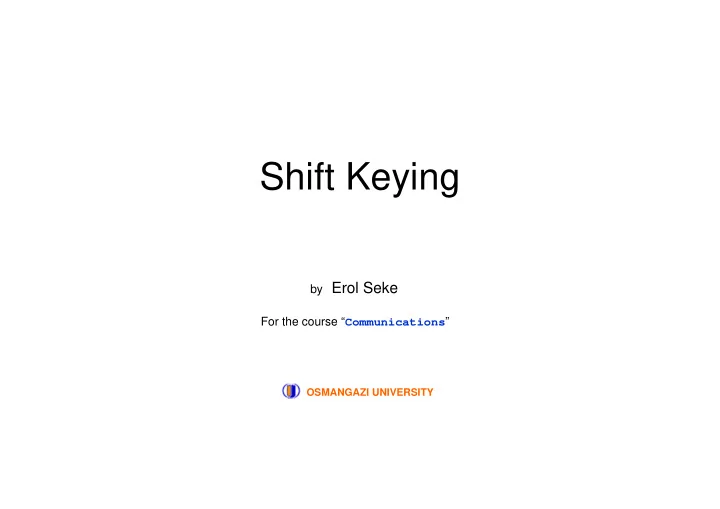

Shift Keying by Erol Seke For the course “ Communications ” OSMANGAZI UNIVERSITY
Basic PCM Binary 1 is represented by voltage A Binary 0 is represented by voltage B Amplitude Shift Keying (ASK) Binary - ASK case carrier If A and B has opposite signs then there will be a phase discontinuity at bit-value changes
Frequency Shift Keying (FSK) Use different frequency values (finite number of) instead of different amplitudes Example : Binary FSK Binary 1 is represented by a sinusoid with frequency f 1 Binary 0 is represented by a sinusoid with frequency f 2 f 1 f 2 Note: Amplitude does not change, phase is not an issue
Phase Shift Keying (PSK) Use different phase values (finite number of), and we get PSK Example : Binary PSK (BPSK) Binary 1 is represented by a sinusoid with 0 phase Binary 0 is represented by a sinusoid with phase π BPSK ( t ) A cos( 2 ft s ( t )) 0 for binary 0 s ( t ) for binary 1 Carrier with phase A Carrier with phase A+ π Note: Amplitude and frequency do not change
Cosine and Sine are Orthonormal f 1 f 1 1 t ( ) 2 t ( ) t t same frequencies t ( ) ( t ) dt 0 1 2 A sinusoidal signal with any phase (at frequency f 1 ) can be obtained by a weighted 2 t ( ) 1 t ( ) sum of these basis waveforms and Q Q Q uadrature component sin I I cos In phase component s ( t ) sin( 2 ft ) cos( 2 ft )
BPSK I Q Symbol Binary Signal 1 0 1 0 cos( 2 f c t ) S1 0 -1 0 S2 1 cos( 2 f c t ) A binary stream 1 1 0 1 0 0 0 1 0 1 1 1 Example shows 1 period per bit. Phase changes This is not necessary. Infact in real systems there are many periods per bit duration.
Differential BPSK DPCM DBPSK Binary BPSK mod. 1/z DBPSK mod. Advantage : Non-Coherent Detection is possible 0-1 change 1 Changes can be easily detected even when there is no reference carrier 0 1-0 change Disadvantage : A bit error affects detection of all remaining bits
General PSK Carriers with different phases cos( 2 f c t ) cos( 2 f c t ) 1 ... PSK cos( 2 f c t ) 2 cos( 2 f c t ) 2 Demux Memory Binary Input Combine multiple bits (usually b bits for M =2 b in M-ary PSK)
Quadrature PSK 01 11 00 10 I Q Symbol Binary Signal 1 0 cos( 2 f c t ) S1 00 -1 0 S2 11 cos( 2 ) f c t cos( 2 / 2 ) 0 1 f c t S3 01 0 -1 S4 10 cos( 2 f c t / 2 )
QPSK 01 00 11 10 I Q Symbol Binary Signal 0.707 0.707 cos( 2 f c t / 4 ) S1 00 -0.707 -0.707 S2 11 cos( 2 f c t 5 / 4 ) -0.707 0.707 cos( 2 3 / 4 ) f c t S3 01 0.707 -0.707 S4 10 cos( 2 f c t 3 / 4 )
QPSK Binary value I Q Modulated I channel In-Phase carrier Modulated Q channel Quadrature-Phase carrier I+Q channel
cos( 2 f c t ) QPSK I Im 0111011...01 I-Q mod. binary stream Q Qm sin( 2 f c t ) 2 2 M I Q I tan 1 ( ) Q
Ir = [ 0.7071 - 0.7071 - 0.7071 0.7071 ] QPSK Qr = [ 0.7071 0.7071 - 0.7071 - 0.7071 ]
Ir = [1 0 -1 0] QPSK Qr = [0 1 0 -1]
8-PSK I Q Binary Signal cos( 2 f c t ) 000 1 0 cos( 2 f c t / 4 ) 001 0.707 0.707 cos( 2 f c t / 2 ) 011 0 1 cos( 2 f c t 3 / 4 ) 010 -0.707 0.707 -1 0 cos( 2 f c t 5 / 8 ) 110 111 -0.707 -0.707 cos( 2 f c t 7 / 8 ) 0 -1 101 cos( 2 f c t 9 / 8 ) 0.707 -0.707 100 cos( 2 f c t 11 / 8 )
8-PSK Q 010 001 Q 011 000 I 010 4 different I and Q values 011 001 111 100 000 I 110 101 111 010 110 100 011 110 101 111 001 Gray-coded 101 000 100
8-PSK Ir = [1 0.7071 0 -0.7071 -1 -0.7071 0 0.7071 ] Qr = [0 0.7071 1 0.7071 0 -0.7071 -1 -0.7071 ] (bit assignments are different than shown in previous slide)
8-PSK Ir = [0.9239 0.3827 -0.3827 -0.9238 0.9238 0.3827 -0.3827 -0.9238] Qr = [0.3827 0.9238 0.9238 0.3827 -0.3827 -0.9238 -0.9238 -0.3827]
END
Recommend
More recommend